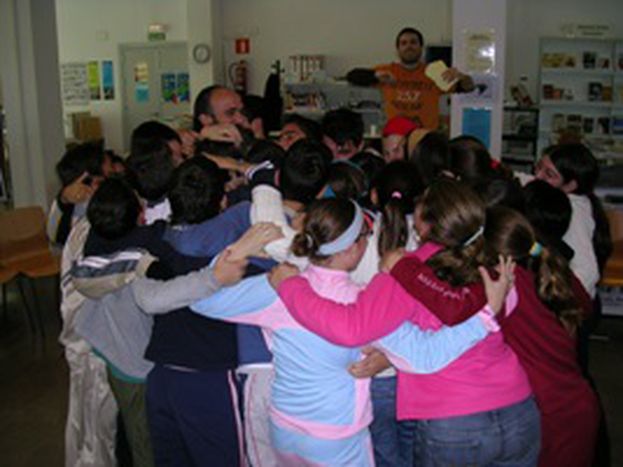
Poor education levels spur reading programmes in Spain
Published on
Translation by:
 luke croll
luke croll
In Andalusia, a new school year has just begun. Town councils strive to introduce and fund more innovative efforts to promote reading
What is most worrying for Jaime García, entertainer and owner of Bibliobla, a small pedagogical business in Seville, is “the complete lack of interest shown by Spanish young people in reading”. This philosophy graduate is getting ready for the back to school rush: 10 months of live pedagogical events to promote reading. It’s 8:30 in the morning and he preparing the first of today’s six events in a school on the outskirts of Dos Hermanas, a dormitory town five minutes away from Seville.
Spanish families are facing up to the high costs of educational material, the lack of places in schools near to their homes and even the possibility of sending their offspring to schools where the electricity or heating does not work. However parents worry mostly about the poor quality of education, as stated in the latest OECD Programme for International Student Assessment (PISA) report on teaching standards.
demonizing books
In 1990, it became compulsory to have a library in each Spanish school. Irene Macías, a young teacher and storyteller, criticizes the government’s move. “It’s quite useless,” she says cuttingly, “since the law didn’t create librarians - school libraries are closed all day long”. “Moreover,” adds Jaime García, “libraries are used for detention or, in the best case scenario, as study rooms. When children misbehave, they are sent to detention and therefore, from a very young age, they associate libraries with prisons.”
Garcia’s events are leisure-based sessions during which a children’s book are presented, based on topics chosen by teachers and the town’s councillors. Today we are starting with a class of 13 and 14 year olds. The book is entitled ‘The Face of Innocence’, a short work about the mistreatment of women. The pupils are happy, because they get to use up an hour of class time, but they do not seem to enthusiastic about the book. It takes Jaime García fifteen minutes to stop the shouting, fighting, spitting and insults. “We allocate one book per term per class. All they have to do is read it,” says José Ramón Céspedes, another reading entertainer. “They can then take part in a literary treasure hunt in the open air and win some prizes.” Nevertheless the reading rate of books presented by Bibliobla only reaches 40%, up from 35% in 2005.
Playing with words
During the session, Jaime García – a battle-hardened veteran of clowning around – finally manages to get the children’s attention using games and to create a comical and relaxed environment. Then, he presents the book and encourages children to guess its contents through a series of clues, mimes or disguises. At the end of the session, he asks them to write stories in they take part, and the most absurd tales are read aloud. The children are seduced by the game though some of them refuse to take part. “The trick is to associate literature with fun, and make them feel important with a book in their hand,” he explains to us. At the end of the morning, a 15-year-old student confronts the entertainer when he suggests to him – with more than a hint of irony – that he stops covering the girl next to him with wet, sloppy kisses. “Why don’t you have a shave, you dirty bastard!” he tells him. The teacher removes him from the classroom and explains to us that, “he lives with his grandmother, his father is a heroin addict who is in prison and his mother died a little while ago”. “I hope that I won’t have to see him on the front page of the newspaper,” says Jaime García with little conviction.
Literature and politics
Pedagogical companies like Bibliobla are spreading like wildfire in Europe. Municipal and regional politicians are financing campaigns to boost the profile of reading in general. Dos Hermanas Divertida is an anti-drug campaign which encourages children to read more. As Nacho Martín, the director of a reading promotion business, points out, “Such campaigns are vote-winners. Children go home and talk about these fun activities, and their parents will take this in account when it comes to voting”. Next spring, there will be municipal elections in Spain, more comedians than ever will be touring classrooms. “I prefer to think about how well the children will remember us when they’re older,” says Jaime García. “As the Israeli writer, Amos Oz says, ‘literature is closing your eyes and opening them again within someone else’s,’ and this is one of the few chances they get to try someone else’s shoes”.
Translated from La animación a la lectura se intensifica en España


